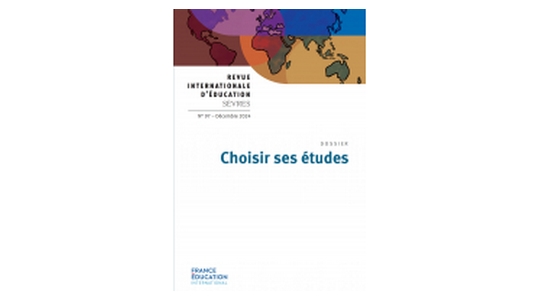24111. Chevaillier, T. (Ed.). (2024). Choisir ses études [How students choose their study pathways]. Revue internationale d’éducation de Sèvres, (97), 53-173. https://doi.org/10.4000/139ca
Progress in school enrolment around the world has been accompanied by a multiplication and diversification of the training courses offered by education systems, in particular to better prepare young people for more skilled and evolving professions. Young people and their parents have demanded and obtained greater freedom to choose their educational pathways, which has contributed to increasing the risks of social discrimination and imbalances in the way schools operate. In an attempt to reduce these risks, the flexibility of pathways to employment has been increased, making school guidance more complex. This dossier presents ten case studies from : Dubai, Spain, China, Burundi, Australia, Algeria, Estonia, Germany, Uruguay and France.
24112. Chevaillier, T. (2024). Portée et limites de la liberté de choix en éducation [Scope and limits of freedom of choice in education]. Revue internationale d’éducation de Sèvres, (97), 53-63. https://doi.org/10.4000/139bt
Progress in school enrolment around the world has been accompanied by a multiplication and diversification of the training courses offered by education systems, in particular to better prepare young people for more skilled and evolving professions. Young people and their parents have demanded and obtained greater freedom to choose their educational pathways, which has contributed to increasing the risks of social discrimination and imbalances in the way schools operate.In an attempt to reduce these risks, the flexibility of pathways to employment has been increased, making school guidance more complex.This dossier presents ten case studies from :Dubai, Spain, China, Burundi, Australia, Algeria, Estonia, Germany, Uruguay and France.
24113. Duru-Bellat, M. (2024). L’orientation en France: entre projet et sélection [Education choices in France: between project and selection]. Revue internationale d’éducation de Sèvres, (97), 163-173. https://doi.org/10.4000/139c3
While the direct transmission of a profession from parents to children is now disqualified in France, as in most comparable countries, the question of young people’s orientation towards a profession is of crucial importance.Supposedly based on academic merit, it gives schooling a decisive weight.Since the 1960s, policies have opened up access to education and sought to make curricula less dependent on students’ social background.But over and above inequalities in success, parents’ efforts to maximize their children’s chances mean that the choices they make depend more on their detailed knowledge of a system that has become much more complex.Young people’s “choices” depend on a socially diversified self-selection process, integrating unequal constraints (greater or lesser risk of failure, weight of geographical origin or gender stereotypes…), according to a logic that is much more academic than vocational.
As long as school careers continue to be shaped by social background, and young people and their families anticipate professions that are unequally desirable, career paths can never reflect the merits or plans of individual students.
